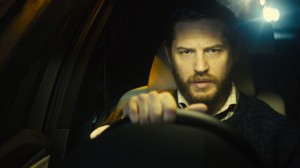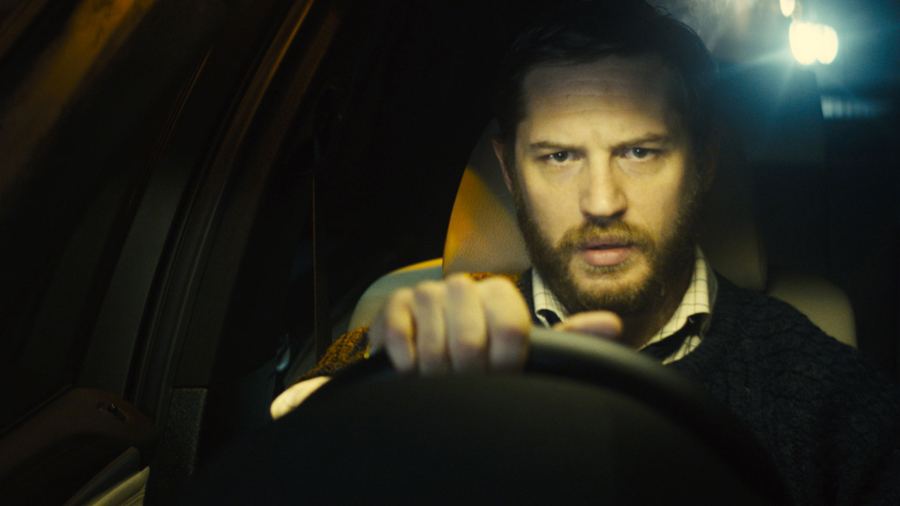Film drives unique cinematic experience
In Locke, writer-director Steven Knight gives audiences a psychological exploration of the murky area between right and wrong, staged entirely inside a moving vehicle. Ivan Locke, brilliantly played by Tom Hardy, drives both the vehicle and the narrative.

Fast car · Tom Hardy, most popularly known for his role in The Dark Knight Rises, delivers an exceptional performance in Locke, the latest film from writer-director Steven Knight. Locke opens in theaters today. – Photo courtesy of Midnight Review
An upper-middle class construction manager, Locke has a passion for concrete and architecture. It might not sound exciting, but after hearing him converse about stable foundations, viewers will never look at concrete the same way again.
The audience follows Locke on the eve of a huge concrete pour that will serve as the foundation for a new high-rise building, a building that will make Locke an owner of “a piece of the sky” in England. To the surprise of his wife and colleagues, however, Locke can’t attend the pour. He has to drive to see the birth of his bastard child, fathered after a wine-induced affair during a business trip.
Despite this plot point, Locke isn’t a playboy. In fact, he’s a hardworking and practical family man who made one mistake — a mistake he’s trying to fix. Locke is insistent on being present for the child’s birth, but faces the dilemma of betraying his own family in the process. The audience also learns about Locke’s own troubled relationship with his father through monologues about him.
As Locke drives from his workplace to the hospital, the car ride transforms into a large juggling act between calls from work, family members and his one-time lover. His colleague Donal (Andrew Scott), who decides to get drunk during the work crisis, calls incessantly and provides some much-needed comic relief. The two bicker like old friends while the mother of his future child — and his wife and kids at home — ring simultaneously.
Knight avoids cliché attempts to build suspense, making the film more original. He doesn’t throw predictable roadblocks like traffic jams or an empty gas tank to build tension.
Locke’s mental struggle never becomes overly dramatic either. Hardy’s eyes fill up with tears, he appears to come down with a cold and coughs occasionally, but aside from one or two F-bombs, he stays away from overperforming to compensate for the constraint of being inside a car.
Knight focuses his energy on crafting realistic characters and creating a dynamic environment despite everything taking place inside a car. Even though we never see other characters and only hear their voices through the Bluetooth inside Locke’s car, the dialogue is so well-written viewers are left feeling like they’ve met the whole cast. The film allows viewers to fill in the blanks of the outside world using their imagination.
Despite being inside a car for an hour and a half, Locke never feels closed in or static. Knight might keep his actor chained down to a seat, but his camera captures movement all around. The highway lights of the M6, passing cars and streetlights, filmed in soft focus create a kaleidoscope of colors that reflect off the smooth exterior of Locke’s BMW. The reflected lights often dance across the static image of Locke. This contrast of movement against the stillness serves as a haunting reminder of Locke’s purgatory. He’s driving to greet a new life into the world while he leaves behind a distraught wife and kids.
Also responsible for distracting from the constraints of the car is Hardy’s nuanced and immensely powerful performance despite his inability to move around the frame. But then again, Hardy is no stranger to restraints. His most well-known performance, Bane in Christopher Nolan’s The Dark Knight Rises, was delivered with a mask covering his face. Hardy was left with only his eyes to convey emotions. Similarly, in Locke, the actor communicates most of his emotions through subtleties in his eyes. Whether it’s a mask covering his face or being seat-belted in a car for the entirety of his performance, Hardy knows how to arrest an audience with very little at his disposal.
The film’s only weakness comes from the occasional monologue delivered to Locke’s deceased father. These Shakespearean tangents feel inorganic, especially in light of the naturalistic dialogue and tone throughout the rest of the film.
Overall, Locke delivers an inventive cinematic experience with a memorable performance by Hardy. Though skeptics might call the staging of the film a gimmick, Knight’s story doesn’t contrive moments of suspense, but rather unfolds into a complicated and delicate observation of the human psyche under pressure.

